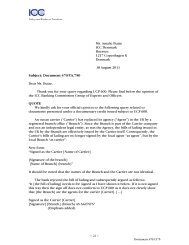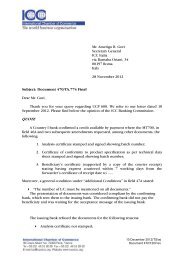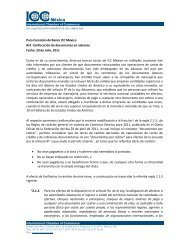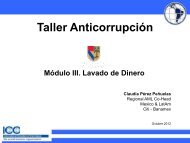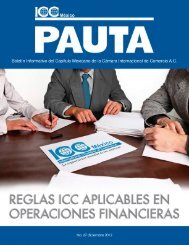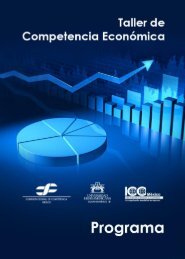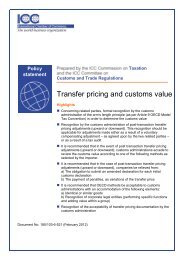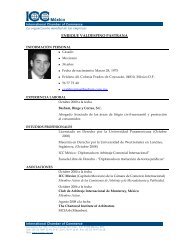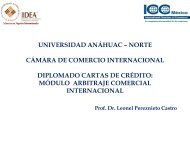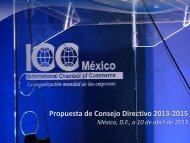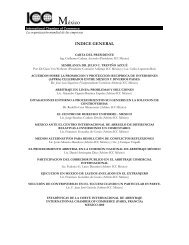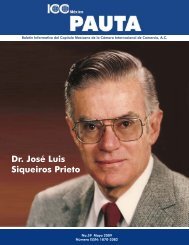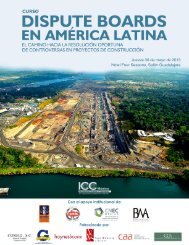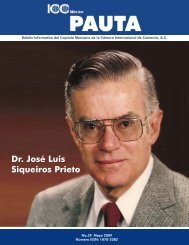Pauta 54.pdf - ICC México
Pauta 54.pdf - ICC México
Pauta 54.pdf - ICC México
- No tags were found...
You also want an ePaper? Increase the reach of your titles
YUMPU automatically turns print PDFs into web optimized ePapers that Google loves.
Final Report on ConstructionIndustry Arbittrations25. Visits can be expensive and difficult to arrange at a time convenient to the parties (who should be represented onit), especially if the tribunal comprises three people. All visits (and tests) must therefore be justifiable in terms ofthe real benefits and costs saved. [Para 41]Programmes and Critical Path Networks26. Claims for delay and disruption require careful handling. It is important that the causative events are clearlyidentified and that events which occurred but which did not delay progress are isolated. The use of Critical PathNetwork (CPN) techniques generally facilitates this process and should be required by the tribunal provided thatthey have already been used in the management of the project. Were CPN techniques not to have been usedduring the construction period of the project, the retrospective preparation of a CPN is almost always expensiveand can produce misleading or unhelpful results. The processes used in preparing a retrospective CPN must befully transparent. The parties and the tribunal must be informed about the logic at the basis of the CPN, theassumptions made and the data entered. This also requires that they all have access to the software used forthe preparation of the CPN and its application. [Paras 42-44]Computation and Quantification of Claims27. Where the evidentiary justification of a claim has not already been provided in the statement of case (or prior tothe proceedings) a claimant ought to be required to produce the primary documents that verify the amountsclaimed, cross-referenced to the statement of case, and in a form that will readily enable the defendant to knowwhere the amounts come from and why they were incurred. The defendant will then have no excuse for notstating the reasons why liability does not exist or if liability exists, why the amounts claimed are nevertheless notdue, e.g. because they were not caused by the events, because they were not incurred or because they were notreasonably incurred. In each case the reasons should be given. [Para 45]Documents and Document Control28. The common law process of discovery (whether the English version or the United States version) in the form that itis practised in domestic fora has to be justified if it is to apply to an international arbitration. It does not otherwisehave a place in <strong>ICC</strong> arbitrations. [Para 52]29. Documents produced by a party should be directly relevant to the issues as defined by the tribunal and should beconfined to those which a party considers necessary to prove its case (or to dispose of the case of the other party)or which are referable to such principal documents in order to make them comprehensible. [Para 52]30. The tribunal should direct the parties to state at the time of its production (and if not then certainly in any prehearingsubmissions) what each document is intended to prove, as there was general agreement that the partiesshould first be required to ensure that they have produced all the documents which are needed for the proof ofthe points at issue. [Para 52]31. The tribunal may obviously call for further documents at any time in order to fulfil its duty to ascertain the facts.The procedural rules ought also to allow a party to request additional documents from another party and, if notprovided, to seek an order from the tribunal, at which stage the legitimacy or reasonableness of the request or ofthe refusal will be decided. [Para 54]32. The tribunal should fix a cut-off date by which no further documents may be produced by any party, unlessrequired by the tribunal, or, exceptionally, permitted by it following a reasoned justification for the lateintroduction of the documents. [Para 55]PAUTA 59



